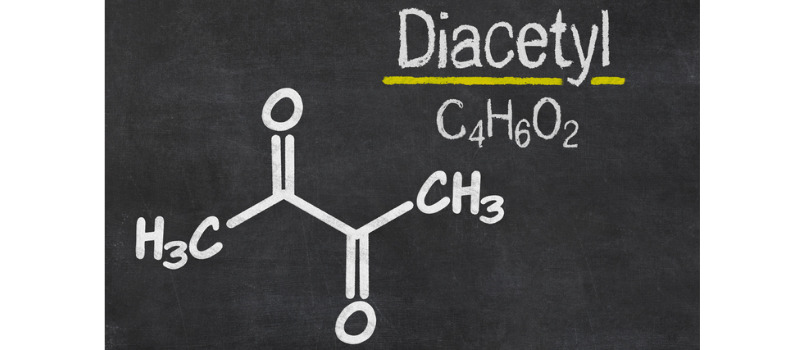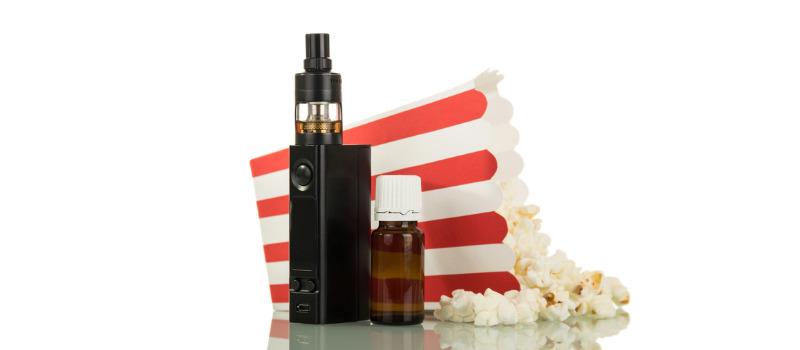To become an absolute expert on e-liquid for electronic cigarettes, there's a topic that'll interest any fan of dessert e-liquid flavors: it's diacetyl. This organic molecule, also called butanedione, is used for its buttery taste.
It's found naturally in many dairy products such as cream, butter, and milk. It's produced by fermenting lactic bacteria, and is widely used by the food industry to make crisps, cakes, and sweets, among other products. Its buttery scent quickly piqued the interest of e-liquid manufacturers, especially in the United States.
However, the mixture of diacetyl and e-liquid frightens the vapers who are careful about what they consume, and for good reason. The molecule is apparently toxic when inhaled, which obviously questions its use in vaping! Let's sort out the truth from the lies on this controversial topic!

Why is diacetyl used in e-liquids?
Initially, the diacetyl molecule was used by the food industry because it gives a buttery taste and smell to food.
This is why some e-liquid manufacturers were tempted to use it to add a creamy and caramelized taste to their recipes, especially in the USA, where they love sweet liquids.
Moreover, the molecule serves as a flavor enhancer. In other words, it brings out even more of the flavors that make an e-liquid recipe.
This sounds like a bargain for e-liquid manufacturers, but all these benefits have potential consequences.
Why is diacetyl controversial in vaping?
If diacetyl is widely used in the food industry, it's mainly because it's completely safe when ingested. However, it doesn't seem to be the case when it's inhaled.
Concerns about the presence of diacetyl in e-liquids aren't new. Since the emergence of vaping as we know it in the 2000s and 2010s, several studies have shown a possible link between the molecule and the development of bronchiolitis obliterans, a potentially fatal lung disease.
The latter is known in the United States as 'popcorn lung', as it largely affected workers in popcorn factories that used diacetyl to make their products.
Following these studies from 2006, the debate shifted towards the vaping industry and its 'dessert' e-liquids in 2014.
The use of food flavorings in e-liquid manufacturing, and more specifically the use of diacetyl in dessert recipes, restarted the debate about the problems caused by inhaling this molecule.

Vaping is supported by scientific research
Professor Konstantinos Farsalinos, a cardiologist and electronic cigarette expert, wanted to shed light on the subject. So, he began his research by dismantling the studies conducted against electronic cigarettes. Indeed, the latter had obvious protocol irregularities, but were wrongly used by many media to attack the whole vaping industry.
Through a study led by the Harvard School of Public Health, the professor showed that 76% of 51 e-liquids tested contain traces of diacetyl or its derivative. Following his own research, titled 'Evaluation of Electronic Cigarette Liquids and Aerosol for the Presence of Selected Inhalation Toxins' (published in Nicotine & Tobacco Research, Volume 17, Issue 2, February 2015, Pages 168-174 ), Dr Farsalinos showed that 74% of 159 e-liquids tested and sent in by 36 manufacturers contain diacetyl.
However, these ratios are much lower than the limits set by the US National Institute for Occupational Safety and Health (NIOSH). This limit is quite relative, however, as it's based on the food industry's work environment. Therefore, these values take into account working hours, ventilation, and product airborne concentration. So, in the end, it's difficult to transpose these standards to vaping.
Thus, the e-liquids' low diacetyl concentration wouldn't be strong enough to pose a risk to your health. Moreover, there hasn't been a proven clinical case linked to the consumption of diacetyl e-liquids since vaping's beginnings in 2005.
France ahead of its time
Whilst it's mostly American-made e-liquids that contain diacetyl, French manufacturers didn't wait for the studies' results to withdraw the molecule from their recipes.
The manufacturers' top priority is to look after vapers' health, so a standard has been implemented in France. The AFNOR ('Association Française de Normalisation') created the NF XP90-300 certification, which recommends a maximum diacetyl content of 22 ppm.
As the electronic cigarette is used to help people quit smoking, it must tend towards total safety. Therefore, the French manufacturers and the FIVAPE campaign for vapers' safety and adapt themselves to the latest scientific advances in this field.
France is one of the countries that tests e-liquids the most. Their compositions are publicly available; that way, you know exactly what you're inhaling.
Also, your bottle of e-liquid displays all the mandatory information and the manufacturer's contacts. That way, you can quickly and easily access the product's info.
What alternative to vape diacetyl-free e-liquids?
As we said above, diacetyl is a molecule that's mostly used in 'dessert' e-liquids. So, if you choose a different type of flavor, you won't have any issues.
In vaping, there are thousands of flavors to choose from. From the classic tobacco taste to fruity or even mentholated flavors, you'll find countless recipes made in France or elsewhere.
However, if you want to vape the flavor you want without worrying about the diacetyl, you can also opt for a French-made liquid.
As we said, France is one of the countries where companies established vaping manufacturing standards from the get-go. Adding to this, a great number of e-liquids are tested each year and regularly analysed in France. The results are publicly available and make new regulations possible.
All the factors, like composition, packaging, and manufacturing location, are carefully studied and controlled to allow you to vape in the best conditions.
Thus, all e-liquids manufactured and sold in France must legally disclose their composition. So, it's easy to know exactly what you're buying.
The status of diacetyl in France
Diacetyl is a molecule that's been used in the food industry for a long time to bring a creamy and buttery texture and smell to products.
In the early 2000s, some e-liquid manufacturers (especially in the USA) quickly approached using these properties to make their liquids.
However, following several studies among popcorn factory workers that link the inhalation of diacetyl to respiratory diseases, a controversy was born, and its use in electronic cigarettes started to be debated.
In France, though, the manufacturers organised themselves right away and took precautionary measures by banning the molecule from French-made e-liquids altogether. Several standards and certifications are then collectively established to guarantee a safe vaping experience for everyone.
Diacetyl made a lot of noise in vaping's infancy, but nowadays, if you buy a certified e-liquid, you can vape with peace of mind!
Our e-liquid-related guides:
- How to change your electronic cigarette's e-liquid?
- Why does an e-liquid turn brown?
- Why do some e-liquids quickly wear down coils?
- Can you vape an e-liquid after its Best-Before date?
- What role does nicotine play in e-liquids and smoking withdrawals?